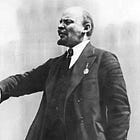I have mainly written about three things on this newsletter: the ‘world’s long NEP’, the ‘soft-fascist mission economy’ (SFME) and artificial intelligence (AI).
My essay on the ‘long NEP’ was subtitled ‘a thought experiment’—what if we already live in the ‘dictatorship of the proletariat,’ in Lenin’s managed capitalism, and how could we tell the difference? The answer was provided, if in a roundabout way, by the essay on the SFME as the political form of post-neoliberalism.
In the dictatorship of the proletariat, there would be no state, and Lenin’s Soviet Union was not the dictatorship of the proletariat, since this would have had to be global. There is an insight worth conserving from the ‘long NEP’ article though—the Soviet Union was capitalist, and capitalism was entering a new global political era of Stalinism—fascism—New Deal-ism. ‘Fordism.’
‘Fordism’ was followed by ‘neoliberalism’, and with neoliberalism economic (2008-) and political (2016-) crisis slowly fading, there is a demand for a new form of governance. This is defined by demands to increase state capacity, which can either take the appearance of ‘pro-market’ or ‘pro-state’ policy. The former would entail the smashing of entrenched interests to ‘deregulate’ an industry (in the UK, planning reform is the obvious example), the latter the protection of citizens from threats geopolitical and technological (surveillance against misinformation and AI misuse, climate austerity).
In the UK, we saw the Labour government winning the elections on the basis of such a ‘mission economy’ platform. Donald Trump’s USA will pursue expansionism and an unlocking of state capacity and agility by streamlining bureaucracy and no doubt augmenting it with AI. The European Union is committed to limiting the spread of ‘far-right’ parties by cynically controlling free speech and nullifying election results.
I first wrote about AI in the autumn of 2023, about a year after the release of ChatGPT. There I argued that the race to be the ‘next big thing’ in Silicon Valley between virtual reality, crypto and AI had been decidedly won by AI, and with it, by the high capitalist corporations. I identified crypto with a petty bourgeois sentimentality towards 19th century free-market capitalism, and AI and virtual reality with various factions of high capital.
I largely still stand by this analysis, which I wrote in the ‘style of the Old Masters,’ that of the pamphlets of Luxemburg, Lenin and Trotsky. The predictions have been borne out so far—crypto and the ‘Metaverse’ are over for now, biotechnology (the next next big thing) is still in its infancy, and AI is on its way to propel the world into the coming period of contradictory prosperity.
Recently I turned to the political problems posed by AI—economic and existential. The economics of AI are relatively simple—like other technologies in capitalism it is not so much about the displacement of human labour but the replacement of human skill with machinery, relegating the labourer to the role of the observer of the production process, making individual labourers interchangeable and thereby devaluing labour as such.
The existential threat from an AI-induced technological catastrophe (mass death caused by uncontrollable goal-seeking and narrow optimisation by a superintelligence) is best thought of as one in a suite of technological risks that includes the atom bomb, climate change and lab-engineered pathogens. Global capitalism manages these risks through a combination of technical fixes and authoritarian international governance.
My short piece on singularity captures the image of a unique decisive act changing the whole world.
There is no sign or prospect for socialism, still—and the only people carrying its memory might be an obscure group named after an Australian mammal. Its absence remains painful. Consciousness of its necessity plausibly buried for another generation. We will see what the coming period, consolidation after crisis, will bring.
What to write next? I feel tasked by my everyday life to write about some mundane policy concerns—as a reflective participant of the formation of SFME governance, it is interesting to see how its transformations play out at the level of individual policies, such as planning reform in the UK. I also want to explore questions of geopolitics, and cultivate an understanding for China in particular. Nearing the end of my 20s I am motivated to finally plug some holes in my education, particularly the classics of Enlightenment philosophy, the bourgeois literary canon, and film. Notes should be taken and the journey documented. Keywords and glimpses: Cultural criticism—music and art. Schönberg and aftermath. Friendship and love. Philosophy of life. Clothes, rugs and gardens. How to hang a painting. How to win at chess. How to make a film.
And in all, a commitment to time well spent, of using the only time we are guaranteed, the present moment.
Here’s to 2025.










